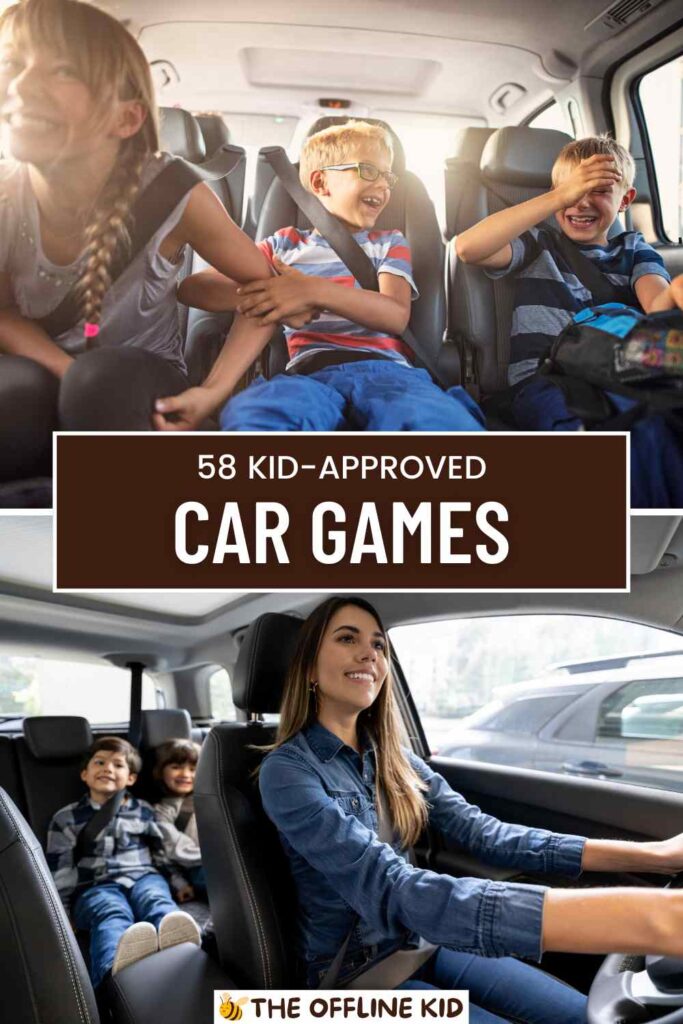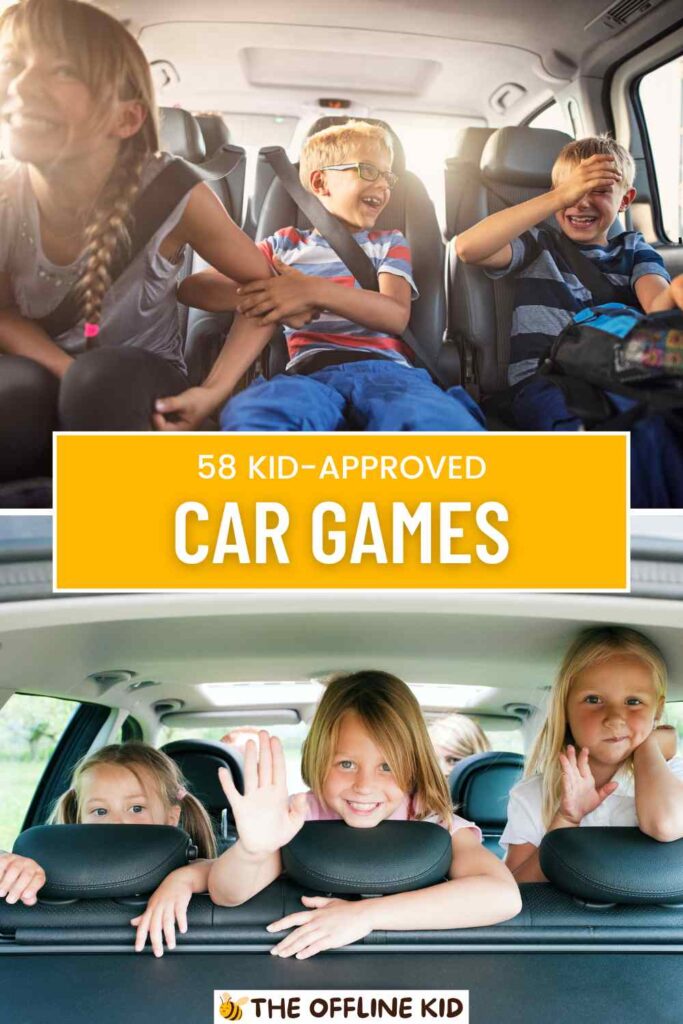Long car rides can be challenging with kids.
Keep them entertained and engaged with this ultimate guide to fun, educational, and creative car games for all ages.
Classic Car Games
I Spy
- How to Play: One person starts by saying, “I spy with my little eye something that is…” and then describes an object they can see, usually by color. The others take turns guessing what the object is.
- Variations for Different Ages: For younger children, use simpler clues and objects. For older kids, add more complex descriptions or limit guesses to a certain number.
20 Questions
- Rules and Setup: One player thinks of an object, animal, or person. The other players take turns asking yes-or-no questions to guess what it is. After 20 questions, everyone must make a final guess.
- Tips for Younger Children: Simplify the game by allowing more than 20 questions or by giving hints along the way.
License Plate Game
- How to Play and Keep Score: Players look for license plates from different states or countries. Each plate spotted earns a point. Bonus points can be awarded for rare or far-away places.
- Creative Variations: Add challenges like finding plates with specific letters, numbers, or colors. Create a bingo card with different state names for added fun.
The Alphabet Game
- Instructions and Variations: Players take turns finding objects or signs that start with each letter of the alphabet, starting from A and going to Z. The first to complete the alphabet wins.
- Adapting for Younger Kids: Instead of going in order, let kids call out letters as they see them. Use picture books to help younger children.
Road Trip Bingo
- How to Make Bingo Cards: Create bingo cards with pictures or words representing common sights on a road trip, such as cows, gas stations, or stop signs.
- Printable Resources: Use online templates or apps to print out customizable bingo cards.
Counting Cows
- How to Play: Divide into teams. Each team counts cows on their side of the road. The team with the most cows wins.
- Different Themes: Instead of cows, count other things like red cars, billboards, or trees. Change themes to keep the game interesting.
Word Association
- Rules and Examples: One person says a word, and the next person must say a related word. For example, “car” could be followed by “road,” then “trip,” and so on.
- Educational Benefits: Enhances vocabulary and quick thinking. For a twist, use categories like animals, foods, or places.
Math Challenges
- Age-Appropriate Math Questions: Create simple math problems for younger kids, such as adding or subtracting small numbers. For older kids, use multiplication, division, or word problems.
- Making it Fun: Turn it into a game show format with points and prizes. Use math apps for additional challenges.
Storytelling Chain
- How to Start and Build a Story: One person starts a story with a sentence. Each subsequent person adds another sentence, building the story collaboratively.
- Encouraging Creativity: Use prompts like “Once upon a time” or “In a magical land” to spark imagination.
Would You Rather?
- Fun and Thought-Provoking Questions: Ask questions like “Would you rather be able to fly or be invisible?” Encourage everyone to explain their choice.
- Engaging Different Age Groups: Tailor questions to the age of the players. Younger kids might enjoy silly questions, while older kids may prefer more challenging scenarios.
Make Up a Song
- Tips for Creating Fun Songs: Choose a familiar tune and create new lyrics about your trip, family, or inside jokes.
- Using Different Themes: Encourage songs about animals, seasons, or favorite activities. Record the songs for a fun keepsake.
Car Karaoke
- Favorite Songs for Kids: Create a playlist of favorite songs. Take turns singing along to each track.
- Setting Up a Car Karaoke Session: Use a smartphone or tablet with a karaoke app. Consider small microphones for added fun.

Interactive and Educational Games
Road Trip Bingo
- How to Make Bingo Cards: Create bingo cards with pictures or words representing common sights on a road trip, such as cows, gas stations, or stop signs. Use stickers or markers to mark off the items as they are spotted.
- Printable Resources: Utilize online templates or apps to print out customizable bingo cards tailored to your route.
Counting Cows
- How to Play: Divide into teams. Each team counts cows on their side of the road. The team with the most cows by the end of a set time wins.
- Different Themes: Instead of cows, count other things like red cars, billboards, or trees. Change themes every so often to keep the game interesting.
Word Association
- Rules and Examples: One person says a word, and the next person must say a related word. For example, “car” could be followed by “road,” then “trip,” and so on.
- Educational Benefits: Enhances vocabulary and quick thinking. For a twist, use categories like animals, foods, or places.
Math Challenges
- Age-Appropriate Math Questions: Create simple math problems for younger kids, such as adding or subtracting small numbers. For older kids, use multiplication, division, or word problems.
- Making it Fun: Turn it into a game show format with points and prizes. Use math apps for additional challenges.
License Plate Game
- How to Play and Keep Score: Players look for license plates from different states or countries. Each plate spotted earns a point. Bonus points can be awarded for rare or far-away places.
- Creative Variations: Add challenges like finding plates with specific letters, numbers, or colors. Create a bingo card with different state names for added fun.
Alphabet Game
- Instructions and Variations: Players take turns finding objects or signs that start with each letter of the alphabet, starting from A and going to Z. The first to complete the alphabet wins.
- Adapting for Younger Kids: Instead of going in order, let kids call out letters as they see them. Use picture books to help younger children.
Geography Quiz
- Using Maps and Landmarks: Challenge kids to identify states, countries, or landmarks as you pass them. Use a map to track your progress.
- Learning About New Places: Provide fun facts about different locations. Create a trivia quiz based on places you pass through.
Scavenger Hunts
- Planning a Car-Friendly Scavenger Hunt: Make a list of items or sights to find during the trip, such as specific cars, animals, or signs.
- Prize Ideas for Winners: Offer small prizes for completed hunts, like stickers, snacks, or extra screen time.
Trivia Challenges
- Creating Trivia Questions: Prepare questions on various topics like science, history, or pop culture. Adjust difficulty based on age.
- Themes for Trivia: Pick themes like “Nature Trivia,” “Movie Trivia,” or “Space Trivia” to keep it exciting and educational.
Storytelling Chain
- How to Start and Build a Story: One person starts a story with a sentence. Each subsequent person adds another sentence, building the story collaboratively.
- Encouraging Creativity: Use prompts like “Once upon a time” or “In a magical land” to spark imagination.
Would You Rather?
- Fun and Thought-Provoking Questions: Ask questions like “Would you rather be able to fly or be invisible?” Encourage everyone to explain their choice.
- Engaging Different Age Groups: Tailor questions to the age of the players. Younger kids might enjoy silly questions, while older kids may prefer more challenging scenarios.
Make Up a Song
- Tips for Creating Fun Songs: Choose a familiar tune and create new lyrics about your trip, family, or inside jokes.
- Using Different Themes: Encourage songs about animals, seasons, or favorite activities. Record the songs for a fun keepsake.
Car Karaoke
- Favorite Songs for Kids: Create a playlist of favorite songs. Take turns singing along to each track.
- Setting Up a Car Karaoke Session: Use a smartphone or tablet with a karaoke app. Consider small microphones for added fun.

Creative and Imaginative Games
Storytelling Chain
- How to Start and Build a Story: One person starts a story with a sentence, such as “Once upon a time, there was a brave knight.” Each subsequent person adds another sentence, building the story collaboratively. Continue until the story reaches a natural conclusion or everyone has had several turns.
- Encouraging Creativity: Use prompts like “In a magical land” or “During a thunderstorm” to spark imagination. Encourage descriptive language and fun plot twists.
Would You Rather?
- Fun and Thought-Provoking Questions: Ask questions like “Would you rather have the ability to fly or breathe underwater?” or “Would you rather be a famous musician or a famous actor?” Each person answers and explains their choice.
- Engaging Different Age Groups: Tailor questions to the age of the players. Younger kids might enjoy sillier questions, such as “Would you rather eat only ice cream or only cake for a year?” while older kids may prefer more complex scenarios.
Make Up a Song
- Tips for Creating Fun Songs: Choose a familiar tune like “Twinkle, Twinkle, Little Star” and create new lyrics about your trip, family, or inside jokes. Encourage everyone to contribute a line or verse.
- Using Different Themes: Suggest themes such as animals, seasons, or favorite activities. For example, make up a song about all the animals you see on the road, or sing about the adventures you hope to have at your destination. Record the songs for a fun keepsake.
Car Karaoke
- Favorite Songs for Kids: Create a playlist of favorite songs from various genres, including pop, children’s classics, and movie soundtracks. Take turns singing along to each track, and encourage everyone to join in for the chorus.
- Setting Up a Car Karaoke Session: Use a smartphone or tablet with a karaoke app. Consider small microphones for added fun and create a mini-concert atmosphere. Have a “karaoke star” of the day who gets to choose the next song.
Guess the Movie
- Describing Movies Without Saying the Title: One person describes a movie’s plot, characters, or famous scenes without mentioning the title. The others try to guess the movie based on the clues given.
- Adapting for Different Age Groups: Use animated movies and simple plots for younger children, and more complex or older movies for teenagers. Add a time limit to make it more challenging.
Fortunately/Unfortunately
- Building a Story with a Twist: Start a story with a sentence, and the next person adds to it, alternating between fortunate and unfortunate events. For example, “Fortunately, it was a sunny day. Unfortunately, we forgot our sunscreen. Fortunately, we found a shady spot.”
- Keeping it Funny and Light-Hearted: Encourage exaggerated and humorous events to keep the game entertaining. This game helps develop quick thinking and creativity.
Two Truths and a Lie
- How to Play: Each person takes turns saying three statements about themselves, two of which are true and one that is a lie. The others must guess which statement is the lie.
- Getting the Whole Family Involved: This game works well for all ages and can reveal fun and surprising facts about each family member. Encourage creative and unusual truths to make the game more interesting.
Name That Animal
- Describing Animals and Guessing: One person describes an animal using clues about its appearance, habitat, and behavior. The others guess which animal is being described.
- Fun Facts to Share: After the animal is guessed, share an interesting fact about it. This game can be educational and fun, sparking curiosity about wildlife.
Categories
- Choosing Categories and Playing: Pick a category such as “Fruits,” “Animals,” or “Cities.” Each person takes turns naming an item in that category. The game continues until someone cannot think of a new item.
- Making it Competitive: Add a time limit for answers or eliminate players who repeat items or take too long to respond. Keep score to determine the ultimate category champion.
These creative and imaginative games will not only keep kids entertained but also stimulate their minds and foster family bonding during car trips. Enjoy the journey as much as the destination with these fun activities!
Games for Younger Children
Color Hunt
- How to Play: Ask your child to find as many items of a specific color as they can see outside the car or within the car. For example, “Find all the red things you can see!”
- Simplifying for Toddlers: Use primary colors and common objects. Celebrate each find to keep them excited and engaged.
Animal Sounds
- Engaging Toddlers with Sounds: Make the sound of an animal and have your child guess which animal it is. Take turns making sounds and guessing.
- Learning Through Play: Discuss each animal after guessing. Share fun facts or imitate the animal’s movements to add another layer of fun.
Counting Games
- Simple Counting Activities: Have your child count specific objects they see outside the car, like “Count all the blue cars” or “How many trees do you see?”
- Using Objects Outside the Car: Count objects like road signs, birds, or houses. This helps with number recognition and keeps their attention outside the vehicle.
Name That Tune
- Playing Familiar Tunes: Hum or play a few notes of a familiar song and have your child guess the tune. This can be done with nursery rhymes or popular children’s songs.
- Encouraging Singing Along: Once the tune is guessed, sing the whole song together. This can turn into a mini car concert and make the ride enjoyable.
Pat-a-Cake
- Classic Hand-Clapping Game: Play this traditional game with the hand movements. It’s perfect for toddlers who enjoy repetitive actions and rhymes.
- Adding New Verses: Create new verses or actions to keep it interesting. This game is great for fine motor skills and rhythm.
Peek-a-Boo
- Playing with Toddlers: This simple game can keep young kids entertained for a while. Use a blanket or your hands to cover your face and then reveal it with a “Peek-a-boo!”
- Using Toys: Play peek-a-boo with their favorite stuffed animals or toys. Hide the toy and have it “peek” out from behind the car seat.
Simon Says
- How to Play: Give commands beginning with “Simon says” and have your child follow them. If you don’t say “Simon says,” they shouldn’t follow the command.
- Adaptations for Car Rides: Use commands that can be done while seated, such as “Simon says touch your nose” or “Simon says clap your hands.”
Finger Puppets
- Engaging with Puppets: Bring along a set of finger puppets and create little stories or scenarios. Let your child use them to act out their own stories.
- Encouraging Imagination: Ask your child to name the puppets and come up with their personalities. This encourages creativity and storytelling.
Sensory Bags
- Creating Sensory Bags: Fill small bags with different textures like beans, rice, or fabric scraps. Let your child explore these bags with their hands.
- Safe Play: Ensure the bags are sealed well to avoid spills. These can be used to calm and entertain young children.
Counting Fingers and Toes
- Simple Counting Game: Count your child’s fingers and toes, then have them count yours. This is a great way to teach numbers and keep them engaged.
- Adding Fun Rhymes: Use rhymes like “This Little Piggy” to make the counting more entertaining.
These games are perfect for keeping younger children entertained and engaged during car rides. They promote learning, creativity, and family interaction, making the journey enjoyable for everyone.

Games for Older Kids
Trivia Challenges
- Creating Trivia Questions: Prepare a set of trivia questions on various topics such as science, history, pop culture, and geography. Adjust the difficulty based on the age and interests of your kids.
- Themes for Trivia: Pick themes like “Nature Trivia,” “Movie Trivia,” or “Space Trivia” to keep it exciting and educational. Award points for correct answers and keep score to determine a winner.
Scavenger Hunts
- Planning a Car-Friendly Scavenger Hunt: Make a list of items or sights to find during the trip, such as specific cars, animals, signs, or landmarks. Provide each child with a list and a pen to check off items as they find them.
- Prize Ideas for Winners: Offer small prizes for completed hunts, like stickers, snacks, or the choice of the next car game. This adds an element of competition and excitement.
Guess the Movie
- Describing Movies Without Saying the Title: One person describes a movie’s plot, characters, or famous scenes without mentioning the title. The others try to guess the movie based on the clues given.
- Adapting for Different Age Groups: Use animated movies and simple plots for younger children, and more complex or older movies for teenagers. Add a time limit to make it more challenging.
Geography Quiz
- Using Maps and Landmarks: Challenge kids to identify states, countries, or landmarks as you pass them. Use a map to track your progress and mark off places you recognize.
- Learning About New Places: Provide fun facts about different locations. Create a trivia quiz based on places you pass through to make it more interactive and educational.
Two Truths and a Lie
- How to Play: Each person takes turns saying three statements about themselves, two of which are true and one that is a lie. The others must guess which statement is the lie.
- Getting the Whole Family Involved: This game works well for all ages and can reveal fun and surprising facts about each family member. Encourage creative and unusual truths to make the game more interesting.
Fortunately/Unfortunately
- Building a Story with a Twist: Start a story with a sentence, and the next person adds to it, alternating between fortunate and unfortunate events. For example, “Fortunately, it was a sunny day. Unfortunately, we forgot our sunscreen. Fortunately, we found a shady spot.”
- Keeping it Funny and Light-Hearted: Encourage exaggerated and humorous events to keep the game entertaining. This game helps develop quick thinking and creativity.
Categories
- Choosing Categories and Playing: Pick a category such as “Fruits,” “Animals,” or “Cities.” Each person takes turns naming an item in that category. The game continues until someone cannot think of a new item.
- Making it Competitive: Add a time limit for answers or eliminate players who repeat items or take too long to respond. Keep score to determine the ultimate category champion.
Word Association
- Rules and Examples: One person says a word, and the next person must say a related word. For example, “car” could be followed by “road,” then “trip,” and so on.
- Educational Benefits: Enhances vocabulary and quick thinking. For a twist, use categories like animals, foods, or places.
Math Challenges
- Age-Appropriate Math Questions: Create simple math problems for younger kids, such as adding or subtracting small numbers. For older kids, use multiplication, division, or word problems.
- Making it Fun: Turn it into a game show format with points and prizes. Use math apps for additional challenges.
Name That Tune
- Playing Familiar Tunes: Hum or play a few notes of a familiar song and have your child guess the tune. This can be done with nursery rhymes or popular children’s songs.
- Encouraging Singing Along: Once the tune is guessed, sing the whole song together. This can turn into a mini car concert and make the ride enjoyable.
These games are perfect for keeping older kids entertained and engaged during car rides. They promote learning, creativity, and family interaction, making the journey enjoyable for everyone.
Group Games for the Whole Family
Categories
- Choosing Categories and Playing: Select a category such as “Fruits,” “Animals,” or “Cities.” Each person takes turns naming an item in that category. The game continues until someone cannot think of a new item.
- Making it Competitive: Add a time limit for answers or eliminate players who repeat items or take too long to respond. Keep score to determine the ultimate category champion.
Two Truths and a Lie
- How to Play: Each person takes turns saying three statements about themselves, two of which are true and one that is a lie. The others must guess which statement is the lie.
- Getting the Whole Family Involved: This game works well for all ages and can reveal fun and surprising facts about each family member. Encourage creative and unusual truths to make the game more interesting.
Fortunately/Unfortunately
- Building a Story with a Twist: Start a story with a sentence, and the next person adds to it, alternating between fortunate and unfortunate events. For example, “Fortunately, it was a sunny day. Unfortunately, we forgot our sunscreen. Fortunately, we found a shady spot.”
- Keeping it Funny and Light-Hearted: Encourage exaggerated and humorous events to keep the game entertaining. This game helps develop quick thinking and creativity.
Name that Animal
- Describing Animals and Guessing: One person describes an animal using clues about its appearance, habitat, and behavior. The others guess which animal is being described.
- Fun Facts to Share: After the animal is guessed, share an interesting fact about it. This game can be educational and fun, sparking curiosity about wildlife.
The Alphabet Game
- Instructions and Variations: Players take turns finding objects or signs that start with each letter of the alphabet, starting from A and going to Z. The first to complete the alphabet wins.
- Adapting for Younger Kids: Instead of going in order, let kids call out letters as they see them. Use picture books to help younger children.
Road Trip Bingo
- How to Make Bingo Cards: Create bingo cards with pictures or words representing common sights on a road trip, such as cows, gas stations, or stop signs. Use stickers or markers to mark off the items as they are spotted.
- Printable Resources: Utilize online templates or apps to print out customizable bingo cards tailored to your route.
Scavenger Hunts
- Planning a Car-Friendly Scavenger Hunt: Make a list of items or sights to find during the trip, such as specific cars, animals, signs, or landmarks. Provide each child with a list and a pen to check off items as they find them.
- Prize Ideas for Winners: Offer small prizes for completed hunts, like stickers, snacks, or the choice of the next car game. This adds an element of competition and excitement.
Guess the Movie
- Describing Movies Without Saying the Title: One person describes a movie’s plot, characters, or famous scenes without mentioning the title. The others try to guess the movie based on the clues given.
- Adapting for Different Age Groups: Use animated movies and simple plots for younger children, and more complex or older movies for teenagers. Add a time limit to make it more challenging.
License Plate Game
- How to Play and Keep Score: Players look for license plates from different states or countries. Each plate spotted earns a point. Bonus points can be awarded for rare or far-away places.
- Creative Variations: Add challenges like finding plates with specific letters, numbers, or colors. Create a bingo card with different state names for added fun.
Word Association
- Rules and Examples: One person says a word, and the next person must say a related word. For example, “car” could be followed by “road,” then “trip,” and so on.
- Educational Benefits: Enhances vocabulary and quick thinking. For a twist, use categories like animals, foods, or places.
Math Challenges
- Age-Appropriate Math Questions: Create simple math problems for younger kids, such as adding or subtracting small numbers. For older kids, use multiplication, division, or word problems.
- Making it Fun: Turn it into a game show format with points and prizes. Use math apps for additional challenges.
These group games are perfect for keeping the whole family entertained and engaged during car rides. They promote learning, creativity, and family bonding, making the journey enjoyable for everyone.

Quiet Games for Restful Moments
Silent Counting
- How to Play: Set a goal for everyone to count silently in their heads up to a certain number, such as 50 or 100. Each person raises their hand when they reach the goal.
- Keeping Kids Engaged Quietly: Make it more interesting by challenging them to count things they see outside, like cars, trees, or billboards.
Memory Game
- Creating a Sequence of Objects: One person starts by saying, “I’m going on a trip, and I’m bringing…” followed by an item. The next person repeats the item and adds another. This continues with each player adding an item to the list.
- Testing Memory Skills: The game ends when someone forgets an item or gets the sequence wrong. Adjust the difficulty by using categories or themes.
Reading Time
- Encouraging Reading During Car Rides: Bring along a selection of books or e-books suitable for your children’s ages and interests. Encourage them to read quietly for a set period.
- Best Books for Car Trips: Choose engaging and age-appropriate books. Consider series books to keep kids excited about the next installment. Audiobooks are a great alternative for those who might get carsick reading.
Puzzle Books
- Types of Puzzle Books: Provide a variety of puzzle books such as crosswords, word searches, Sudoku, or activity books. These can keep kids entertained quietly for a long time.
- Engaging Older Kids: Select more challenging puzzles for older children. Encourage them to work together or compete to see who can finish first.
Coloring Books and Activity Pads
- Bringing Along Supplies: Pack coloring books, crayons, and activity pads that include mazes, dot-to-dots, and simple crafts.
- Quiet Creativity: Encourage kids to color or complete activities quietly. Offer praise and display their artwork at stops.
Sticker Books
- Interactive Fun with Stickers: Provide sticker books where kids can place stickers in different scenes or complete activities with stickers.
- Variety of Themes: Choose themes that interest your children, such as animals, vehicles, or favorite characters.
Magnetic Games
- Portable and Mess-Free: Use magnetic travel games such as chess, checkers, or tic-tac-toe that can be played quietly without losing pieces.
- Solo and Two-Player Options: Provide games that can be played alone or with a sibling to keep them entertained.
Origami
- Learning Paper Folding: Bring along simple origami instructions and paper. Show your kids how to fold basic shapes like cranes, boats, or flowers.
- Quiet Concentration: This activity requires focus and can be very calming. It also results in fun, tangible creations.
Handheld Electronic Games
- Educational Apps and Games: Load a tablet or handheld device with educational games and apps that can be played quietly. Ensure that the volume is low or use headphones.
- Limiting Screen Time: Set time limits for electronic games to ensure a variety of activities during the trip.
Travel Journals
- Encouraging Kids to Document Their Journey: Provide notebooks or journals for kids to write about their trip, draw pictures, or paste in souvenirs like tickets and postcards.
- Apps and Tools for Digital Journaling: Use digital journaling apps for tech-savvy kids. They can add photos, notes, and even voice recordings about their experiences.
These quiet games are perfect for moments when you need a peaceful atmosphere during your car trip. They help kids relax and stay occupied, making the journey more enjoyable for everyone.


